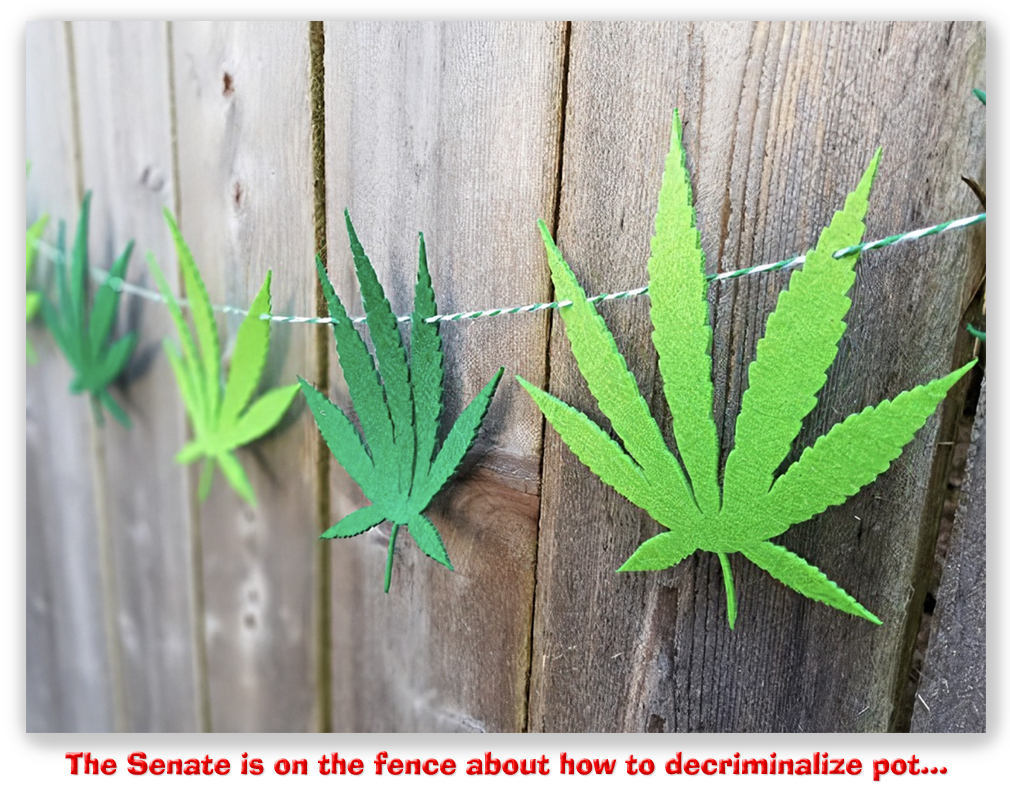We post news and comment on federal criminal justice issues, focused primarily on trial and post-conviction matters, legislative initiatives, and sentencing issues.

SUDDENLY, CRIMINAL JUSTICE LEGISLATION IS IN TROUBLE
Just last Friday, I mused that the EQUAL Act (S.79) – the much-heralded legislation that would finally make penalties for cocaine distribution identical regardless of the form the cocaine took (cocaine base or cocaine powder) – might have a little competition.
 Now, that seems to be like predicting the Russians might run into a little delay on their way to Kyiv.
Now, that seems to be like predicting the Russians might run into a little delay on their way to Kyiv.
On Friday, it looked like a few Republican senators might want to leverage their SMART Cocaine Sentencing Act to win a few amendment concessions before EQUAL passes. Now, the problem seems much more extreme than that.
At the end of last week, The New York Times reported, “with control of Congress at stake and Republicans weaponizing a law-and-order message against Democrats in their midterm election campaigns, the fate of [the EQUAL Act] is in doubt. Democrats worry that bringing it up would allow Republicans to demand a series of votes that could make them look soft on crime and lax on immigration — risks they are reluctant to take months before they face voters… Even the measure’s Republican backers concede that bringing it to the floor could lead to an array of difficult votes.”
You may recall that on Thursday, Senators Roger Wicker (R-Mississippi), Charles Grassley (R-Iowa), Mike Lee (R-Utah) and Lindsey Graham (R-South Carolina) announced SMART, a bill that would reduce the current 18:1 crack-to-powder ratio to 2.5:1 instead of EQUAL’s 1:1.
(If Lindsay Graham’s name seems familiar, maybe that’s because he is also a co-sponsor of the EQUAL Act).
But diddling with the ratio is not all that SMART does. For people already convicted under 18:1, there would be no retroactivity unless the Attorney General “certified” to the court that the sentence should be reduced. Mind you this is the same Dept. of Justice that rejects thousands of clemency petitions before they ever reach the White House and fights hammer and tong against any inmate seeking First Step Act Section 404 reductions.
 Imagine nominating Scrooge to plan Santa Claus. Same thing.
Imagine nominating Scrooge to plan Santa Claus. Same thing.
Grassley argued last week that the EQUAL Act does not account for the differences in recidivism rates between the two types of cocaine offenses. He said crack offenders reoffend at a 60.8% rate while powder cocaine offenders are at only 43.8%, and crack defendants are the most likely drug offenders to carry weapons.
The obvious rejoinder is that if the crack offenders are carrying weapons, there are Guidelines enhancements (such as § 2D1.1(b(1)) and even separate statutory offenses that do a much better job of targeting the people with the guns than punishing one class of drug offenders for the probability that the person has a weapon. As for recidivism, the Guidelines already increase sentencing ranges based on the defendant’s criminal history. Arguing that a crack offender must be punished more severely than a cocaine powder offender because he or she is statistically more likely to commit a crime in the future has a certain “Minority Report” aura to it.
FAMM President Kevin Ring blasted SMART on Twitter for
INCREASING the # of people who will be subject to man mins for powder while reducing the # subject to man mins for crack. Remember, no member had suggested powder sentences were too low until the EQUAL Act gained steam.” Plus, SMART “requires the Attorney General to certify every request for retroactive application of the new penalties. This is unprecedented and absurd. No retroactive changes in recent history – by the Commission or Congress – ever required AG certification.
But beyond the weird provisions of SMART is the fear that it may spell the death of EQUAL. Ohio State University law professor Doug Berman said in his Sentencing Law and Policy blog, worried that “the fact that the EQUAL Act has not become law already makes me concerned about the fate and future or long-overdue efforts to end the crack/cocaine sentencing disparity.”
“The time for negotiation has passed, and it passed a long time ago,” said Jason Pye from the Due Process Institute. “The EQUAL Act is an exercise in bipartisanship, which is more than I can say for Senator Grassley’s bill.”
Meanwhile, expectations are wavering over the marijuana legalization bill that Senate Majority Leader Charles Schumer (D-NY) promised would be introduced in April. Now lawmakers have pushed the timeline back to later in the summer as continued debate threatens the bill’s success.
 Schumer said he wanted to give senators time to debate certain provisions. The Senate majority leader said he is reaching across party lines to gain support for the bill, but experts predict he won’t have enough Republican votes for passage. The bill faces opposition from some Democrats, including Sen Joe Manchin (D-WV), who last month told The Hill that is he unsure about legalizing adult-use marijuana.
Schumer said he wanted to give senators time to debate certain provisions. The Senate majority leader said he is reaching across party lines to gain support for the bill, but experts predict he won’t have enough Republican votes for passage. The bill faces opposition from some Democrats, including Sen Joe Manchin (D-WV), who last month told The Hill that is he unsure about legalizing adult-use marijuana.
Last month, the Marijuana Opportunity, Reinvestment and Expungement (MORE) Act passed the House with a near-party line vote that included only three Republicans. MORE is not expected to pass the Senate.
As the November midterms approach, it is likely that criminal justice will become even more of a political game, with federal prisoners as the football.
The New York Times, Drug Sentencing Bill Is in Limbo as Midterm Politics Paralyze Congress (April 29, 2022)
S.__ (no number yet), SMART Cocaine Sentencing Act
Sen Charles Grassley, Senators Introduce Bill To Reduce Crack-Powder Sentencing Disparity, Protect Communities From Criminals Most Likely To Reoffend (April 28, 2022)
Politico, Huddle: Freedom Caucus at a crossroads (April 29, 2022)
Twitter, Kevin Ring, Current Crack-Powder Disparity Is Unjustifiable (April 28, 2022)
Sentencing Law and Policy, GOP Senators introduce competing crack/powder sentencing reform bill tougher than EQUAL Act (April 29, 2022)
The Paper, Cannabis News (April 28, 2022)
– Thomas L. Root




